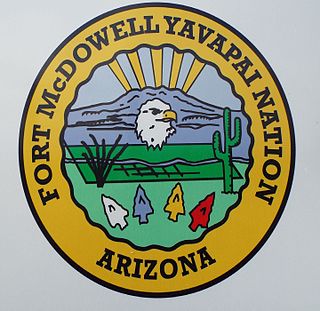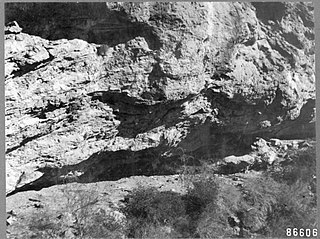
Coconino County is a county in the north-central part of the U.S. state of Arizona. Its population was 145,101 at the 2020 census. The county seat is Flagstaff. The county takes its name from Cohonino, a name applied to the Havasupai people. It is the second-largest county by area in the contiguous United States, behind San Bernardino County, California. It has 18,661 sq mi (48,300 km2), or 16.4% of Arizona's total area, and is larger than the nine smallest states in the U.S.

Yavapai County is near the center of the U.S. state of Arizona. As of the 2020 census, its population was 236,209, making it the fourth-most populous county in Arizona. The county seat is Prescott.

Prescott is a city and the county seat of Yavapai County, Arizona, United States. As of 2020 Census, the city's population was 45,827.
Indigenous peoples of Arizona are the Native American people who currently live or have historically lived in what is now the state of Arizona. There are 22 federally recognized tribes in Arizona, including 17 with reservations that lie entirely within its borders. Reservations make up over a quarter of the state's land area. Arizona has the third largest Native American population of any U.S. state.

The Western Apache live primarily in east central Arizona, in the United States and north of Mexico in the states of Sonora and Chihuahua. Most live within reservations. The Fort Apache Indian Reservation, San Carlos Apache Indian Reservation, Yavapai-Apache Nation, Tonto Apache, and the Fort McDowell Yavapai Nation are home to the majority of Western Apache and are the bases of their federally recognized tribes. In addition, there are numerous bands. The Western Apache bands call themselves Ndee (Indé). Because of dialectical differences, the Pinaleño/Pinal and Arivaipa/Aravaipa bands of the San Carlos Apache pronounce the word as Innee or Nnēē:.

The Yavapai-Prescott Indian Tribe, formerly known as the Yavapai-Prescott Tribe of the Yavapai Reservation, a federally recognized tribe of Yavapai people. Fewer than 200 people are enrolled in the tribe.

The Yavapai–Apache Nation is a federally recognized Native American tribe in the Verde Valley of Arizona. Tribal members share two culturally distinct backgrounds and speak two indigenous languages, the Yavapai language and the Western Apache language. The Yavapai–Apache Nation Indian Reservation, at 34°37′10″N111°53′46″W, consists of five non-contiguous parcels of land located in three separate communities in eastern Yavapai County. The two largest sections, 576 acres (233 ha) together – almost 90 percent of the reservation's territory, are in the town of Camp Verde. Smaller sections are located in the town of Clarkdale 60.17 acres (24.35 ha), and the unincorporated community of Lake Montezuma. The reservation's total land area is 642 acres (260 ha). The total resident population of the reservation was 743 persons as of the 2000 census. The 2010 Census reported 1,615 people on the reservation. Of these, 512 lived in Camp Verde, 218 in Clarkdale, and only 13 in Lake Montezuma.

The Tonto Apache is one of the groups of Western Apache people and a federally recognized tribe, the Tonto Apache Tribe of Arizona. The term is also used for their dialect, one of the three dialects of the Western Apache language.

The Hualapai is a federally recognized Native American tribe in Arizona with about 2300 enrolled members. Approximately 1353 enrolled members reside on the Hualapai Reservation, which spans over three counties in Northern Arizona.

The San Carlos Apache Indian Reservation, in southeastern Arizona, United States, was established in 1872 as a reservation for the Chiricahua Apache tribe as well as surrounding Yavapai and Apache bands removed from their original homelands under a strategy devised by General George Crook of setting the various Apache tribes against one another. Once nicknamed "Hell's Forty Acres" during the late 19th century due to poor health and environmental conditions, today's San Carlos Apaches successfully operate a Chamber of Commerce, the Apache Gold and Apache Sky Casinos, a Language Preservation program, a Culture Center, and a Tribal College.
Yavapai is an Upland Yuman language, spoken by Yavapai people in central and western Arizona. There are four dialects: Kwevkepaya, Wipukpaya, Tolkepaya, and Yavepe. Linguistic studies of the Kwevkepaya (Southern), Tolkepaya (Western), Wipukepa, and Yavepe (Prescott) dialects have been published.

Viola Jimulla was the Chief of the Prescott Yavapai tribe. She became Chief when her husband, who was also a Chief of the tribe, died in an accident in 1940. She remained Chief until her death. She was known for improving living conditions, and for her work with the Presbyterian Church.

The Yavapai are a Native American tribe in Arizona. Historically, the Yavapai – literally “people of the sun” – were divided into four geographical bands who identified as separate, independent peoples: the Ɖulv G’paaya, or Western Yavapai; the Yaavpe', or Northwestern Yavapai; the Gwev G’paaya, or Southeastern Yavapai; and the Wiipukpaa, or Northeastern Yavapai – Verde Valley Yavapai.

The Fort McDowell Yavapai Nation, formerly the Fort McDowell Mohave-Apache Community of the Fort McDowell Indian Reservation, is a federally recognized tribe and Indian reservation in Maricopa County, Arizona about 23 miles (37 km) northeast of Phoenix.

The Yavapai Wars, or the Tonto Wars, were a series of armed conflicts between the Yavapai and Tonto tribes against the United States in the Arizona Territory. The period began no later than 1861, with the arrival of American settlers on Yavapai and Tonto land. At the time, the Yavapai were considered a band of the Western Apache people due to their close relationship with tribes such as the Tonto and Pinal. The war culminated with the Yavapai's removal from the Camp Verde Reservation to San Carlos on February 27, 1875, an event now known as Exodus Day.

Patricia Ann McGee (Yavapai-Hualapai) was a Native American tribal leader who served as president of the Yavapai-Prescott Tribe. An effective advocate for her tribe, she garnered millions of dollars in federal and state funds to improve the infrastructure on the Yavapai reservation. She negotiated a water settlement agreement between the federal government and the tribe and established the first gaming license for any Indian tribe in Arizona. She helped develop a community center which earned a federal design award and served as an educational center to preserve both the culture and language of the Yavapai. In 2006, McGee was nominated by Supreme Court Justice Sandra Day O'Connor and inducted into the Arizona Women's Hall of Fame.

Joseph Mayer was an American businessman, gold prospector and pioneer who founded the town of Mayer, Arizona.














